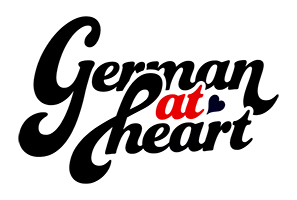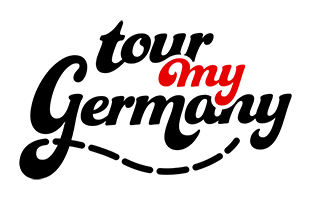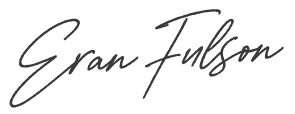New cookbook is here! Free ebook copy with purchase until midnight, Feb. 15th
North Rhine-Westphalia, Germany: Travel Guide to NRW
By: Gerhild Fulson / Using her extensive experience and cultural knowledge, Oma Gerhild provides trusted, authentic, and easy-to-follow German recipes both here and in her many cookbooks.
Hallo und herzlich willkommen!
Get ready to explore North Rhine-Westphalia (German: Nordrhein-Westfalen, or NRW for short), a state that perfectly blends industrial heritage, cultural diversity, and natural beauty. Located in western Germany, NRW is known for its vibrant and large cities, rich history, world-class museums, and the warmth of its people.
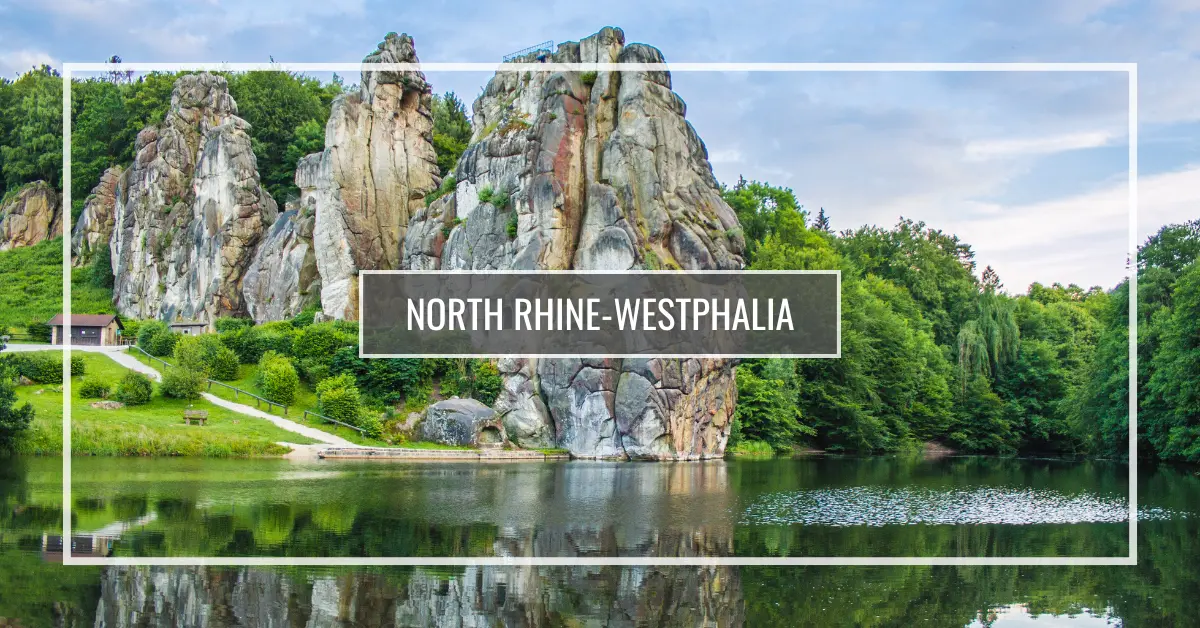 The Externsteine in Horn-Bad Meinberg
The Externsteine in Horn-Bad MeinbergOn this page:
A bit of North Rhine-Westphalian history
Let's kick off our journey to discover NRW with a quick history lesson. This fascinating region wasn't always the bustling, diverse place we know today. Its story is as varied as its landscape.
North Rhine-Westphalia was formed in 1946, but its roots go much deeper. The area was originally inhabited by Germanic tribes before becoming part of the Holy Roman Empire. The Middle Ages saw the rise of powerful city-states and the flourishing of trade along the Rhine.
The real change came with the Industrial Revolution in the 19th century. The Ruhr Area, with its rich coal deposits, became the industrial heartland of Germany. Factories sprang up, cities grew, and NRW became an economic powerhouse.
World War II hit NRW hard, with many cities suffering severe damage. But the region rebuilt and reinvented itself. The post-war years saw NRW at the forefront of Germany's economic miracle or Wirtschaftswunder.
Today, among the federal states, NRW is Germany's most populous and its economic engine. It's a place where old industrial sites have been transformed into cultural centers, where ancient cathedrals stand alongside modern architecture, and where tradition and innovation walk hand in hand.
Where in the world is North Rhine-Westphalia?
Nestled in the western part of Germany, North Rhine-Westphalia is perfectly positioned at the heart of Europe. It shares borders with Lower Saxony to the north, Hesse to the southeast, Rhineland-Palatinate to the south, and even dips its toes into international waters with the Netherlands and Belgium to the west.
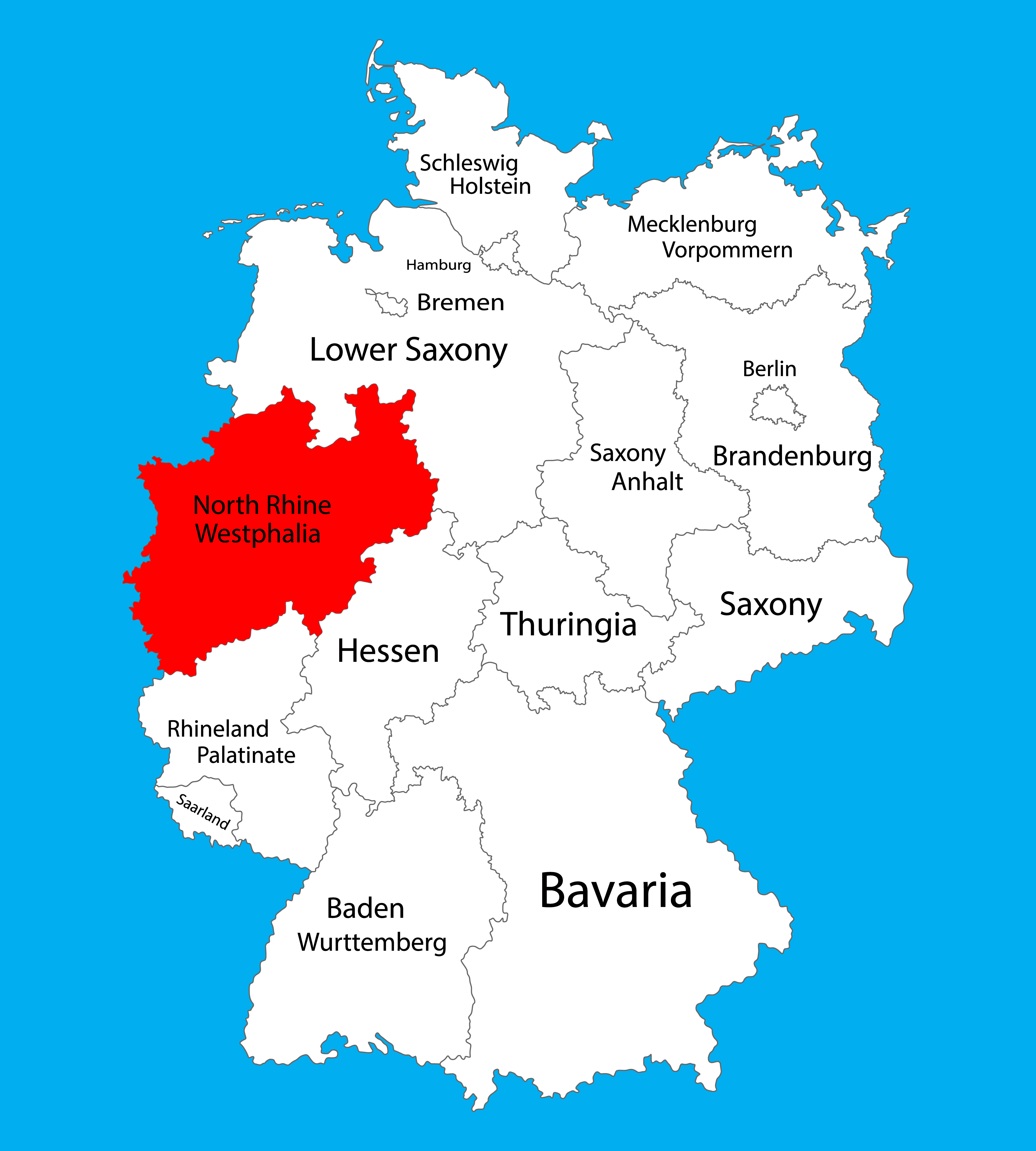
Covering an area of about 13,600 square miles (34,110 square kilometers), NRW is a land of contrasts. The northern part is characterized by the North German Plain, with its gentle hills and fertile farmland. As you move south, the landscape becomes more varied, however it's not considered a mountainous region.
The star of the show is undoubtedly the Rhine River, which flows through the state, passing through cities like Düsseldorf and Cologne. The other rivers — the Ruhr, Lippe, and Ems — all play their part in shaping the landscape as well.
To the east, you'll find the Teutoburg Forest, a range of low, forested hills perfect for hiking and mountain biking. Then there's the Ruhr Area, once the industrial heart of Germany, which now is a fascinating blend of urban landscapes and green spaces.
The climate? Well, it's typically German — which means it can be unpredictable. Expect mild summers and cool winters, with rainfall spread throughout the year. But don't let a little rain dampen your spirits — there's always a cozy café or fascinating museum nearby!
Discover the Unique Culture of North Rhine-Westphalia
What makes NRW truly special? Its vibrant and diverse culture. This state is a melting pot of traditions, languages, and lifestyles, all stirred together to create something uniquely North Rhine-Westphalian.
Language and Dialects
First things first — the language. While High German (Hochdeutsch) is spoken everywhere, you'll hear various dialects that can make you feel like you're traveling through different countries. In the Rhineland, you might hear Kölsch in Cologne or Düsseldorfer Platt in Düsseldorf. Head to the Ruhr Area, and you'll encounter Ruhrdeutsch, a dialect as colorful as the region's history.
Festivals and Celebrations
If there's one thing North Rhine-Westphalians know how to do, it's celebrate. The crown jewel of NRW's festival calendar is undoubtedly Carnival (Karneval). Cologne's carnival is world-famous, transforming the city into a riot of color, costumes, and confetti for several days. But don't miss out on Düsseldorf's equally enthusiastic celebrations.
Throughout the year, you'll find a broad range of festivals celebrating everything from music (like the Ruhr Piano Festival) to literature (Lit.Cologne) to film (International Short Film Festival in Oberhausen).
Music and Arts
NRW is a paradise for culture enthusiasts. The state boasts world-class museums like the Museum Ludwig in Cologne and the Museum Kunstpalast in Düsseldorf. Music lovers will have plenty of options, with venues ranging from the cutting-edge Jahrhunderthalle in Bochum to the classical Cologne Philharmonic Hall.
Cuisine
Let's talk food! NRW's cuisine is as diverse as its population. In Cologne, you must try Himmel un Ääd (Heaven and Earth), a hearty dish of mashed potatoes with apples and black pudding. Düsseldorf is well-known for its Altbier, a top-fermented beer that's a local institution. And in the Ruhr Area, don't miss out on Currywurst, a spicy sausage that was born in Berlin, but is almost more popular here.
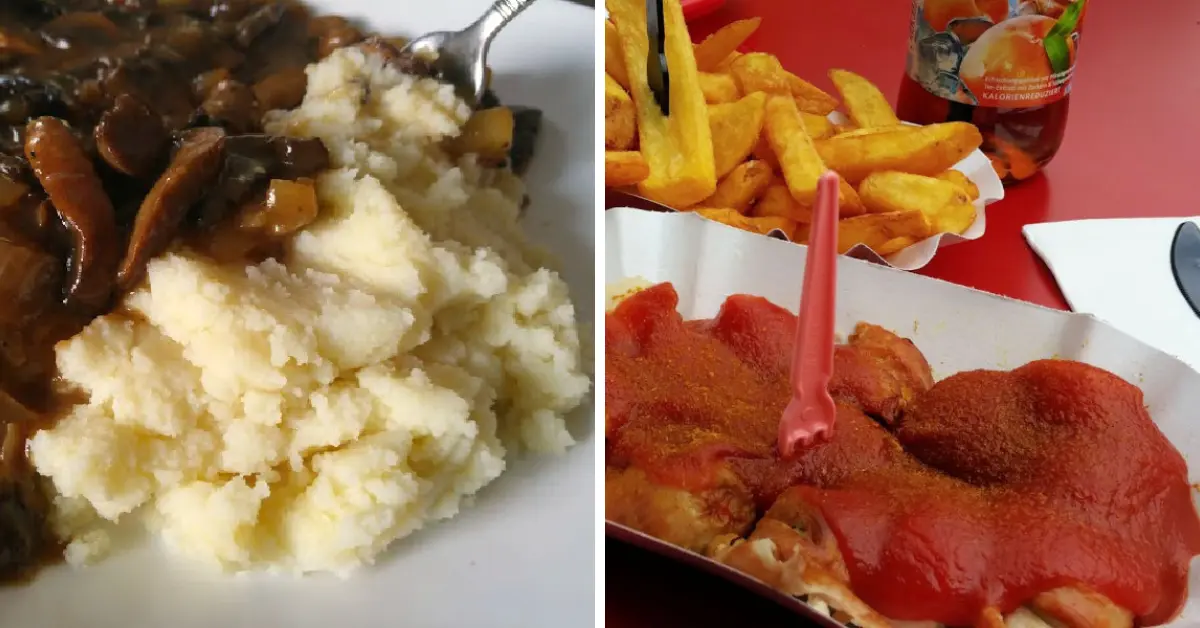 Heaven and Earth & Currywurst
Heaven and Earth & CurrywurstThe Best Places to Discover North Rhine-Westphalia
Ready to explore? Let's take a whirlwind tour of some of NRW's must-visit spots!
Cologne (Köln)
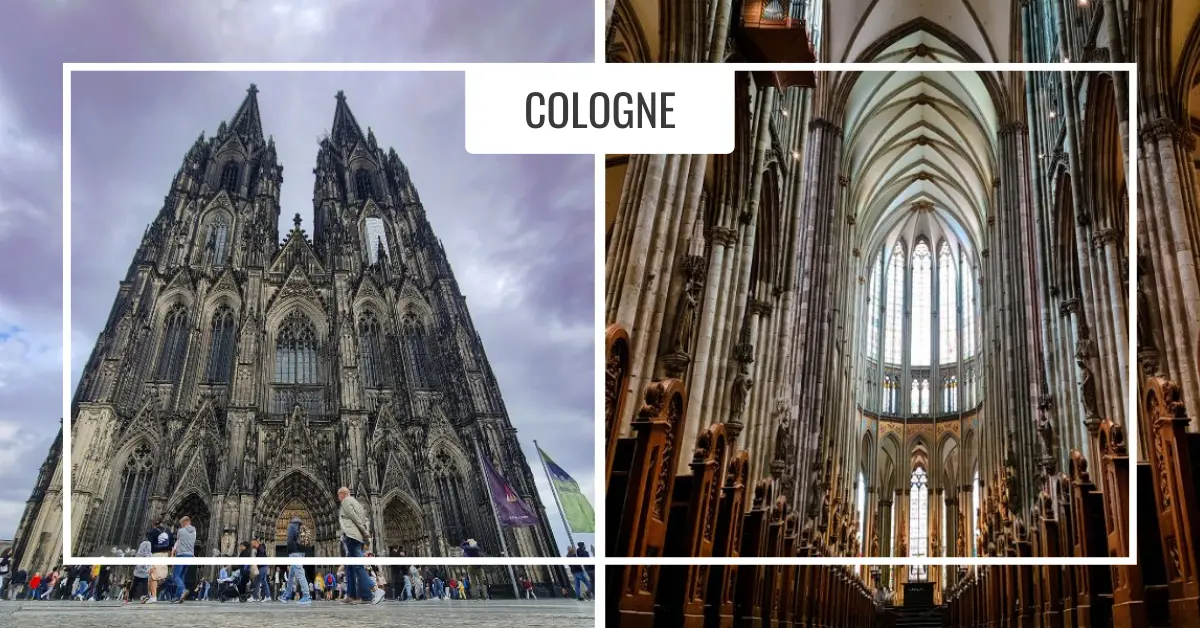 Awestruck looking up in the Kölner Dom.
Awestruck looking up in the Kölner Dom.We'll start with Cologne, NRW's largest city and a place that captures the heart of everyone who visits.
The star of the show is undoubtedly the Cologne Cathedral, the Kölner Dom, the city's towering Gothic cathedral. Climb the 533 steps to the top for a breathtaking view of the city.
Don't miss the Museum Ludwig for modern and contemporary art, or the Chocolate Museum if you have a sweet tooth. And as the sun sets, head to the old town for a glass of Kölsch, the local beer served in small, cylindrical glasses.
Düsseldorf
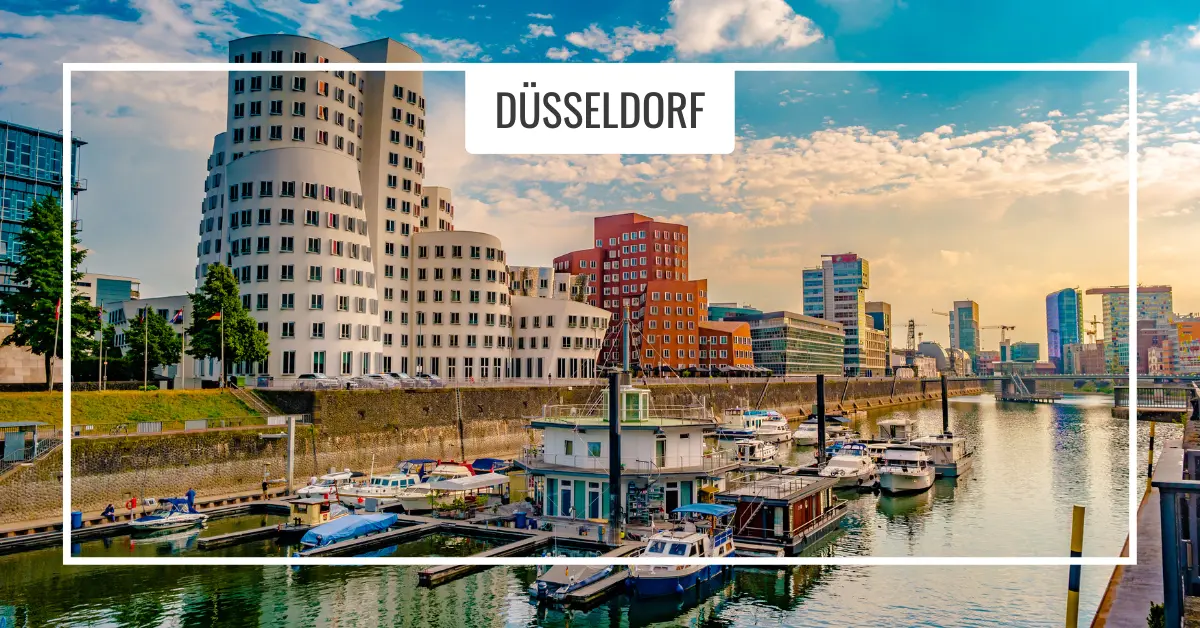
Next stop, the state capital: Düsseldorf. This chic city is known for its fashion, art, and Japanese community (the largest in Germany). Stroll down the Königsallee, one of Europe's most elegant shopping streets, or explore the MedienHafen, where modern architecture meets the Rhine.
Anyone exploring Düsseldorf inevitably traces the paths of the global artist, Joseph Beuys, whose public life and landmarks in the city are well documented. Art lovers should make a beeline for the K20 and K21 museums, showcasing 20th and 21st-century art respectively.
And don't forget to try the local Altbier in the Altstadt (Old Town), affectionately known as "the longest bar in the world" due to its 300+ bars and breweries.
Bonn
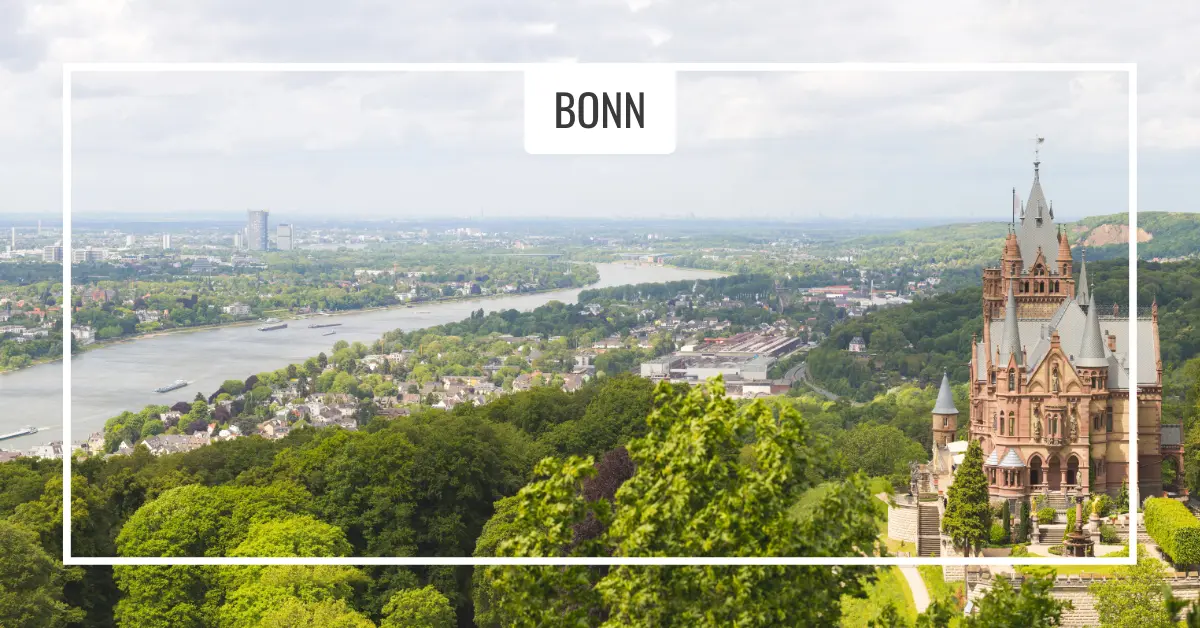
Bonn, the former capital of West Germany, is a city steeped in history and culture.
Visit the birthplace of Beethoven, now a museum dedicated to the composer's life and works. The Haus der Geschichte offers a fascinating look at German history post-1945.
For a breath of fresh air, head to the Rheinaue, a beautiful park along the Rhine perfect for picnics and leisurely strolls.
Dortmund
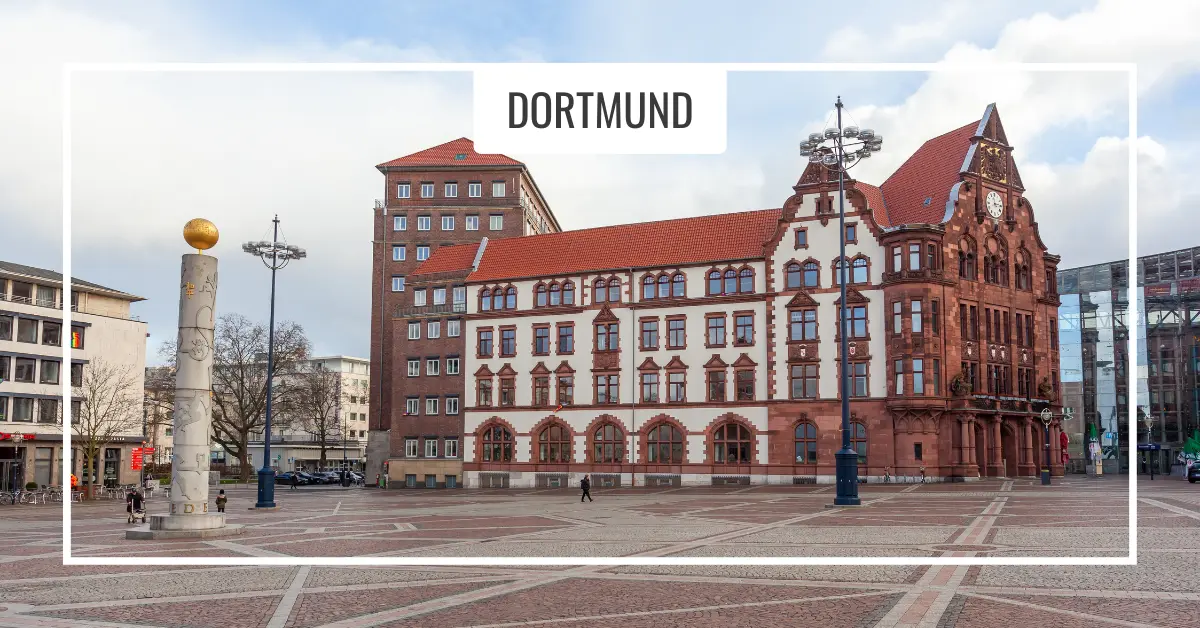
In the heart of the Ruhr Area, Dortmund is a city that's reinvented itself. Once a center of coal and steel production, it's now a hub of technology and green spaces.
The German Football Museum is a must for soccer fans, while the Zollverein coal mine industrial complex, the Zollern Colliery offers a glimpse into the area's industrial past.
Don't miss the Dortmunder U, a former brewery turned cultural center with a rotating cube on top that's become a city landmark.
Aachen
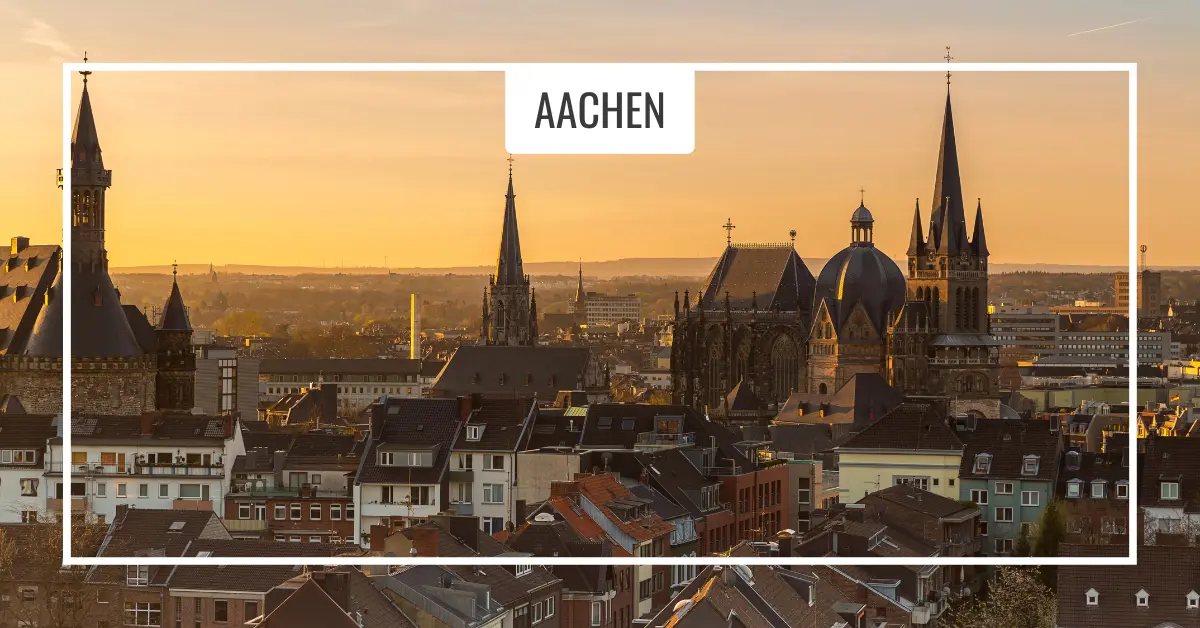
Last but not least, let's visit Aachen, a city with a royal past.
The Aachen Cathedral, burial place of Charlemagne, is a UNESCO World Heritage site and a masterpiece of medieval architecture.
After exploring the cathedral, treat yourself to a Aachener Printen, a type of gingerbread that's a local specialty.
Additional Travel Tips
Ready to pack your bags? Here are some final tips to make your NRW adventure unforgettable:
When to come
NRW is a year-round destination, but each season has its charms. Summer (June to August) is perfect for outdoor activities and festivals. Fall brings beautiful colors to the forests and parks. Winter, especially around Christmas, is magical with festive markets in every city. Spring sees the region burst into bloom.
How to travel
Getting around NRW is a breeze thanks to excellent public transportation. The state has an extensive network of trains, trams, and buses. Consider getting a regional pass like the NRW-Ticket for unlimited travel within the state.
For exploring cities, bikes are a great option — many cities have bike-sharing programs.
Local customs
North Rhine-Westphalians are known for their friendliness and down-to-earth directness. Don't be surprised if strangers strike up a conversation at a bar or on public transport — it's all part of the local charm.
Speak like a local?
While most people speak English, learning a few local phrases can be fun. Here are some to get you started:
- Tach > Hello > Ruhr Area
- Kölle Alaaf! > Long live Cologne! > Cologne's carnival greeting
- Wat möchste? > What would you like? >Ruhr Area
- Lecker > Delicious
And there you have it — your guide to traveling in North Rhine-Westphalia! From the Gothic spires of Cologne to the post-industrial landscapes of the Ruhr, from world-class museums to cozy breweries, NRW is a state that never fails to surprise and delight.
So pack your bags, bring your sense of adventure, and get ready to explore one of Germany's most diverse and exciting regions. As they say in the Ruhr Area, Glück auf! — Good luck and enjoy your journey!





